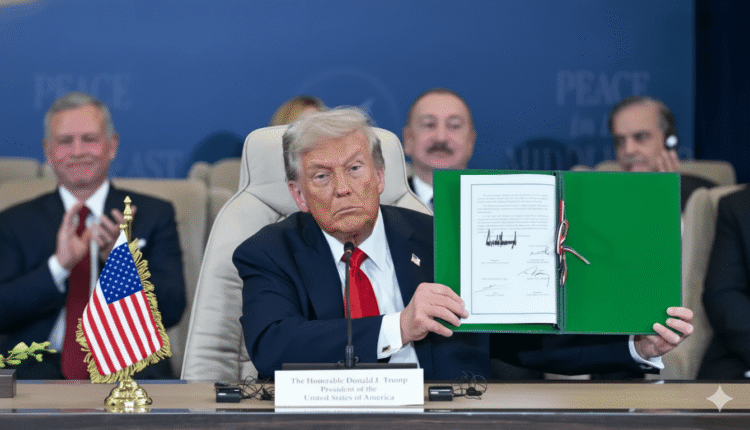
From illusion to true peace: Trump’s challenge in Gaza and Ukraine
Trump – (Special Correspondent / Web Desk) – United States President Donald Trump calls himself a peacemaker, often boasting about his efforts to end the wars in Gaza and Ukraine. Yet behind his speeches lies little real progress. The issue is not his lack of action, but his misunderstanding of what peace truly means. Trump mistakes short-term ceasefires for lasting peace, which often collapse quickly. Like many presidents before him, he remains tied to the military-industrial complex that profits from endless wars rather than ending them.
Real peace is not just stopping the fighting for a while. It means solving the political problems that caused the war in the first place. Achieving this requires understanding history, respecting international law, and addressing the political and territorial issues that drive conflict. Without resolving these root causes, every ceasefire is just a pause before violence starts again.
Trump’s so-called “peace plan” for Gaza offers no real solution. It fails to address the heart of the issue — Palestinian statehood. A genuine peace plan must include an end to Israel’s military aggression, Hamas’s disarmament, recognition of Palestine as a UN member state, and normalization of diplomatic ties between Israel and Palestine. None of these elements are present in Trump’s plan, which is why no nation has endorsed it despite claims from Washington.
Instead, Trump’s proposal aims to distract from growing international support for Palestinian independence. It allows Israel to continue its occupation of the West Bank and bombardment of Gaza under the guise of security. Israeli Prime Minister Benjamin Netanyahu has made it clear that his goal is to eliminate any chance of a Palestinian state. Trump’s plan, therefore, serves to advance Netanyahu’s ambitions rather than build real peace.
Like many failed peace efforts before it — from the Oslo Accords to the Camp David Summit — Trump’s plan treats Palestinian statehood as a distant dream rather than the solution itself. If Trump truly wanted to end the war, he would have to challenge the power of major defense corporations and technology firms that profit from U.S. military aid. Since October 2023, the U.S. has spent over $21.7 billion on military support to Israel, much of which benefits American companies.
Trump would also need to break away from powerful donors like Miriam Adelson and the Zionist lobby. Doing so would align him with the majority of Americans who support a Palestinian state and the global consensus favoring a two-state solution based on UN resolutions and international law.
The same pattern is visible in Ukraine. Trump’s repeated claim that he could end the war “in 24 hours” ignores the political roots of the conflict. His proposal is again just a ceasefire, not a true peace deal. The war’s origins lie in NATO’s expansion and the 2014 U.S.-backed coup in Kyiv, which triggered the current crisis. Real peace in Ukraine can only come when the country becomes neutral, serving as a bridge between Russia and NATO rather than a battlefield.
Pakistan Army Vows Strong Stand Against Threats
In 2022, Turkiye helped broker peace talks based on Ukraine’s neutrality, but the U.S. and U.K. pressured Ukraine to withdraw. Without a clear end to NATO’s expansion plans, lasting peace is impossible. A durable solution must involve mutual security for Russia, Ukraine, and NATO nations through honest negotiation.
War is often described as the continuation of politics by other means, but it is better seen as the failure of politics. When leaders avoid addressing core political disputes, war becomes inevitable. True peace demands courage — the courage to negotiate and to stand up to those who profit from conflict.
No U.S. president since John F. Kennedy has genuinely tried to achieve peace. Many believe that Kennedy’s assassination marked the moment when the military-industrial complex took control of Washington’s policies. Decade’s later, American arrogance still drives foreign policy, as seen in its belief that pressure, propaganda, and sanctions can force submission — from Russia in Ukraine to Muslims in Palestine.
Trump and the political establishment, beholden to corporate and military interests, continue these dangerous illusions. Despite years of war in both regions, the U.S. has failed to bring peace while defense companies grow richer. Still, there remains hope. Reality, as always, cannot be ignored.
Pakistan to Introduce New Passport Design with Enhanced Security and Cultural Features
As Trump prepares to meet Russian President Vladimir Putin in Budapest, Hungarian Prime Minister Viktor Orban may guide him toward the truth — that NATO’s expansion must stop for peace in Ukraine. Likewise, Muslim leaders like Turkiye’s Erdogan, Saudi Arabia’s Mohammed bin Salman, Egypt’s el-Sisi, and Indonesia’s Prabowo Subianto can help Trump understand that recognizing Palestine as a UN member state is essential for peace in Gaza.
If Trump embraces true diplomacy, he could become a real peacemaker. But to do so, he must stand up to the war industry, reject political pressure, and listen to the will of the people who long for lasting peace.




Comments are closed, but trackbacks and pingbacks are open.